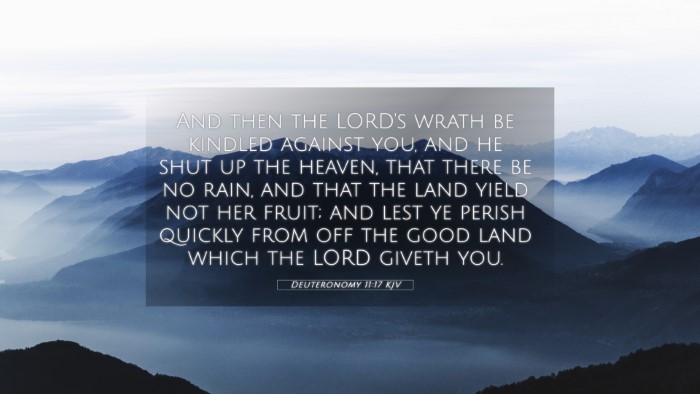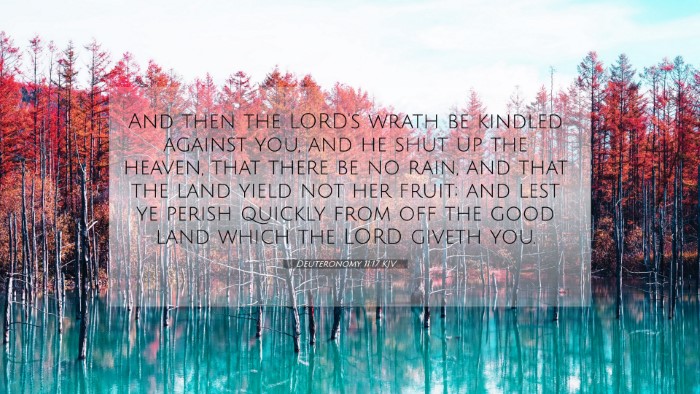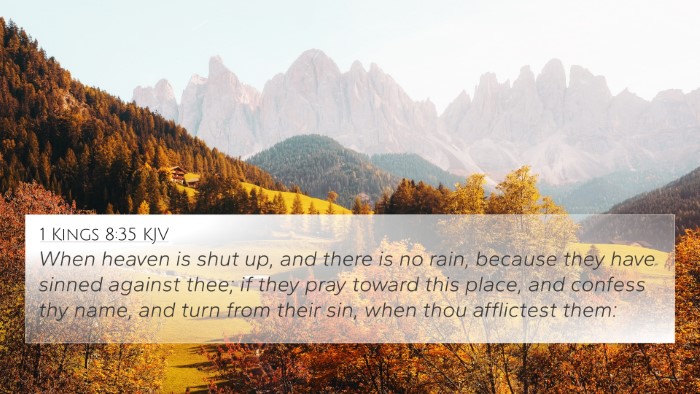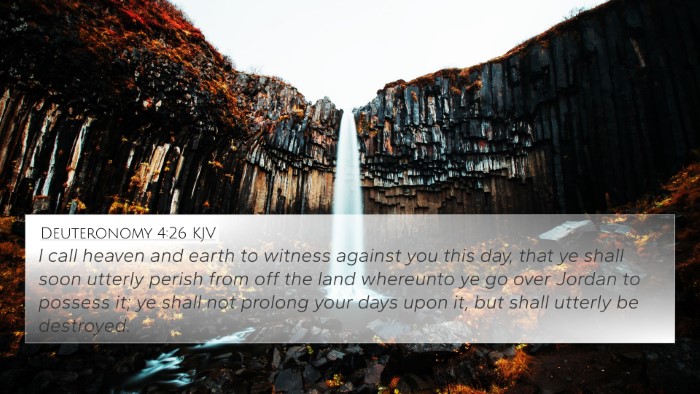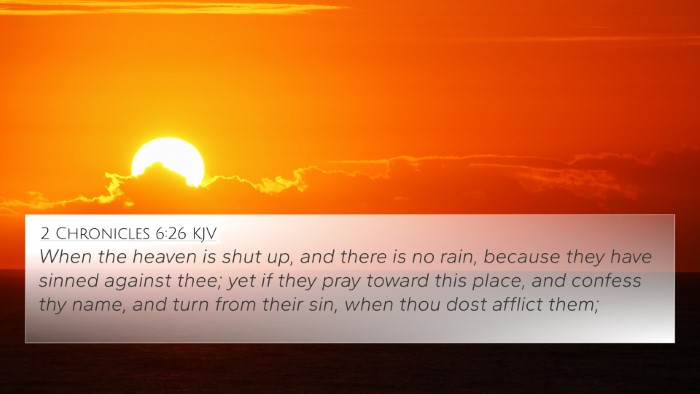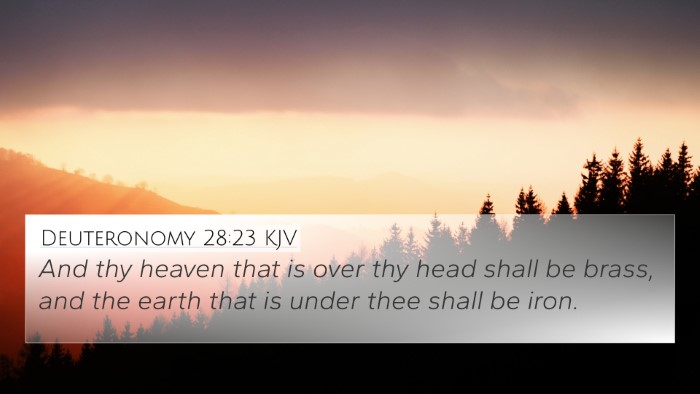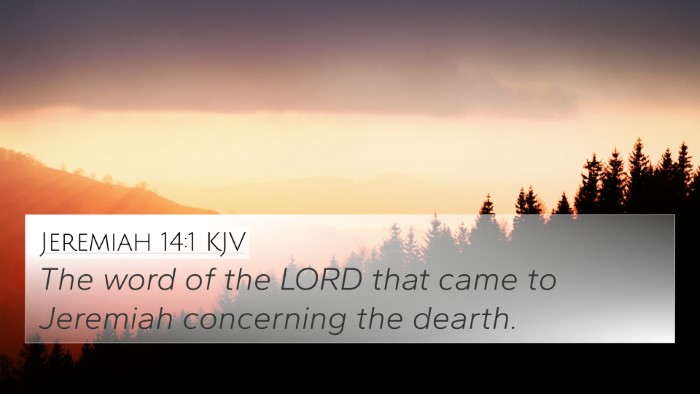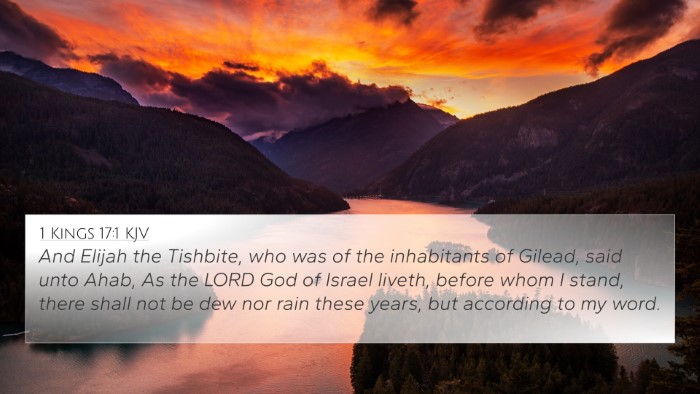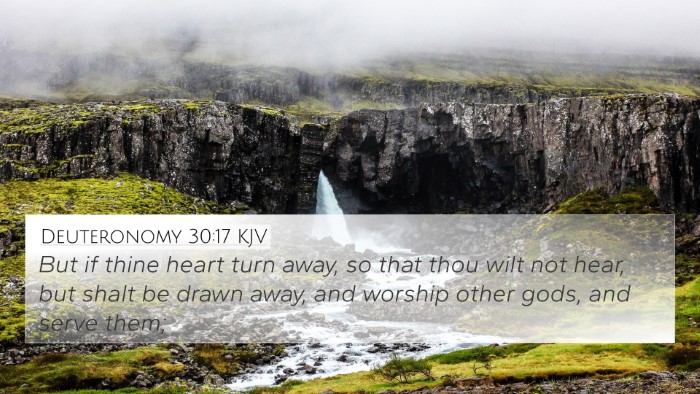Understanding Deuteronomy 11:17: A Comprehensive Analysis
Deuteronomy 11:17 states:
"And then the LORD's anger will be kindled against you, and he will shut up the heavens so that there will be no rain, and the land will yield no produce, and you will perish quickly off the good land that the LORD is giving you."
This verse serves as a warning and builds upon the covenant relationship established by God with the Israelites. Below is a detailed examination of its context and significance as gleaned from public domain commentaries.
Contextual Insights
Deuteronomy, meaning "the second law," is a restatement of God's laws given to the Israelites as they prepared to enter the Promised Land. This particular verse emphasizes the serious consequences of disobedience to God's commands.
Commentary Summaries
-
Matthew Henry:
Henry highlights the conditional nature of blessings and curses within the covenant. He states that turning away from God leads to dire consequences, such as the withholding of rain, which symbolizes spiritual drought as well as physical scarcity.
-
Albert Barnes:
Barnes elaborates on the idea of divine retribution. He notes that the withholding of rain reflects the absence of God's favor and the resultant desolation of the land. This is a warning that underscores the importance of faithfulness to God’s commands.
-
Adam Clarke:
Clarke connects this warning with the historical experiences of Israel, noting that God's judgments serve both as a punishment and as a caution for the future. He draws attention to the relationship between following God’s statutes and the bounty of the land.
Thematic Connections
This verse can be connected thematically with several key principles in scripture:
- God's Sovereignty: The verse highlights God's control over the natural world and the blessings of the land.
- Disobedience and Judgment: It serves as an illustration of the broader biblical principle that disobedience to God leads to consequences.
- Covenantal Relationship: The verse reiterates the intimate relationship between God and His people, where adherence to His commandments brings blessings.
Cross-References
Deuteronomy 11:17 shares connections with various Bible verses, enhancing its meaning through cross-referencing:
- Deuteronomy 28:12: Discusses blessings tied to obedience, mirroring the consequences highlighted in 11:17.
- 2 Chronicles 7:13-14: Emphasizes the connection between divine favor and the prayerful repentance of a nation.
- James 5:17-18: Reflects on the power of prayer regarding rain, linking human intercession with God’s will over nature.
- 1 Kings 8:35-36: Relates the closing of the heavens to a call for repentance, advocating obedience for restoration.
- Isaiah 1:19-20: Speaks to the blessings tied to obedience while warning about the consequences of rebellion.
- Hosea 4:3: Illustrates how the land suffers due to the disobedience of its people.
- Malachi 1:9: Addresses the disregard of God’s commands and the resultant consequences upon the people.
Practical Applications
This verse serves as a profound reminder about the importance of maintaining one's relationship with God through obedience. Believers today can reflect on the following:
- Understanding the importance of a faithful heart that seeks to follow God’s commands.
- Recognizing the reciprocal nature of blessings and obedience as illustrated throughout scripture.
- Engaging in sincere prayer and repentance when straying from God’s path, echoing the themes presented in other related verses.
Conclusion
Deuteronomy 11:17 reflects a significant theme in the Bible regarding divine warnings and the blessings that come with obedience. By examining this verse through the lens of public domain commentaries and cross-references, one can gain a deeper understanding of the interconnectedness of scripture and the serious implications of our choices in faith.
Further Studies
For those interested in diving deeper into the connections between scriptures, a variety of tools for Bible cross-referencing, such as concordances and Bible reference resources, can assist in exploring how various verses relate to each other. Understanding the links between Old and New Testament teachings can enhance one’s grasp of the biblical narrative and the thematic dialogues that run throughout the text.
Encouragement for Continuous Learning
Engaging with the Bible through various methods, including cross-referencing Bible study, allows us to uncover the rich tapestry of God’s message. Consider this as a continual journey into discovering the depths of scriptural wisdom.

